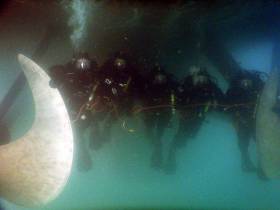Displaying items by tag: Staff Crisis
Diving Section in Naval Service Hit Hard by Staffing Crisis
Divers of the Naval Service which form an elite unit in the force is operating at less than a quarter of its intended capacity as a result of the Defence Force’s retention crisis.
Naval Service Diving Section according to The Irish Times, is the only dive team in Ireland capable of carrying out deep sea operations. It has a wide variety of roles but its most prominent function is carrying out search and recovery operations for missing persons.
It carries out an average of 15 missing person searches every year, some of which last for up to two weeks at a time.
The diving section has an establishment strength of 27 divers but is operating with just six as a result of highly trained personnel leaving for the private sector. Moreover, the problem is compounded by a lack of replacements coming through.
The diving section has not been at full strength since before the reorganisation of the Defence Forces in 2012 which was marked by significant cuts to resources and a new manpower limit of 9,500.
Click here for further reading on the story.
























































